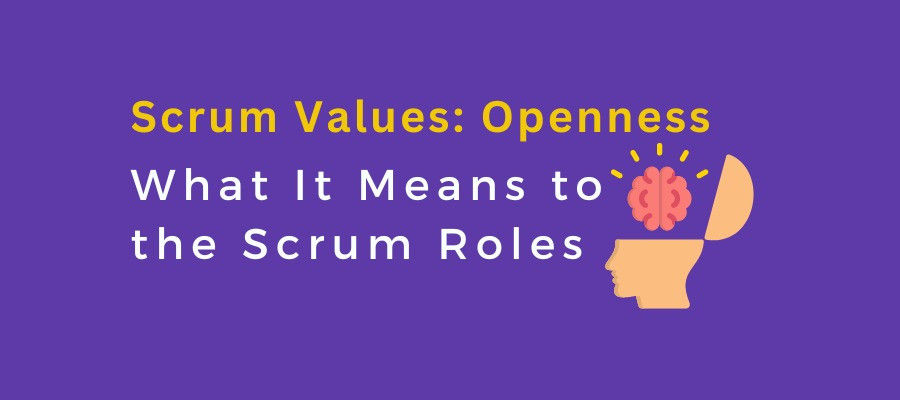Scrum Values: Openness – What It Means to the Scrum Roles

Scrum isn’t just about frameworks, roles, or ceremonies. At its core, Scrum is a mindset, a set of values that guide how teams collaborate, learn, and grow. Of these values—focus, openness, courage, commitment, and respect—openness is perhaps the most challenging to embrace.
But what does openness mean in the context of Scrum? And how does it manifest across different Scrum roles—like Developers, Product Owners, and Scrum Masters? Let’s dive in and explore how openness transforms a Scrum Team from just going through the motions to genuinely thriving.
Understanding “Openness” as a Scrum Value
Openness in Scrum isn’t just about sharing information; it's about creating an environment where everyone feels safe to express their ideas, admit mistakes, and ask for help. It’s about being honest with ourselves and our team members, even when uncomfortable.
Imagine a typical Scrum Team. The Developers, the Product Owner, and the Scrum Master work together to deliver value. But challenges come up—unexpected bugs, unclear requirements, or feedback from stakeholders that changes everything. Without openness, these challenges can plague, creating frustration and slowing progress. But with transparency, the team can address these issues head-on, adapt quickly, and keep moving forward.
Why Does Openness Matter in a Scrum Team?
Openness is essential when dealing with the complexity and unpredictability that often accompany Agile projects. It promotes the idea of empiricism that prioritizes experience over skills to make decisions based on what is known. Openness drives transparency, a cornerstone of Scrum, enabling the team to inspect their work and adapt accordingly.
- Promotes Transparency: When team members are open about their progress, blockers, and challenges, it creates a transparent work environment. Transparency is critical to practical inspection and adaptation, allowing the team to adjust their plans and stay aligned with the Sprint Goal.
- Encourages Asking for Help: Openness empowers team members to speak up when they need help. In a genuinely open team, no one hesitates to say, “I don’t know,” because they know they’ll receive support rather than judgment.
- Facilitates Offering Help: Openness also means being proactive in offering help. Team members can leverage each other's strengths and experiences, leading to faster problem-solving and a stronger, more cohesive team.
- Supports Team Decisions: When everyone feels heard, they are more likely to support team decisions, even if they don’t always agree. This buy-in is critical for maintaining momentum and morale.
How Openness Shows Up in Different Scrum Roles
So, how does openness translate to the different roles within a Scrum Team?
Developers: Embracing Vulnerability and Transparency
For Developers, openness can mean stepping out of their comfort zones. It involves admitting when they don’t have all the answers, or something isn’t working as planned. So, they tend to share the development challenges earlier to adapt plans dynamically and receive peer support.
Product Owner: Welcoming Feedback and Collaboration
For a Product Owner, openness means being transparent about the Product Backlog, soliciting feedback, and being willing to make changes based on that feedback. It’s all about open communication.
Scrum Master: Promoting a Culture of Openness
For a Scrum Master, openness means more than transparency— cultivating an environment where openness thrives. It’s about encouraging the team to embrace experimentation through self-management and honest Sprint Retrospectives.
How Does The Scrum Framework Element Promote Openness?
Scrum has built-in elements that naturally promote openness:
- The Sprint: Scrum encourages openness to change by limiting the Sprint duration to one month or less. The shorter the Sprint, the more adaptable the team becomes.
- The Sprint Goal: While the Sprint Goal remains fixed, the plan to achieve it is open to change. This flexibility allows the Developers to adapt based on what they learn as they progress.
- Product Backlog Transparency: An open Product Backlog allows stakeholders to see what’s planned for the product and what isn’t, fostering trust and collaboration.
- Sprint Review: Openly sharing progress with stakeholders, soliciting feedback, and collaborating on the next steps demonstrate openness in action.
- Sprint Retrospective: Focused on continuous improvement, the Sprint Retrospective invites openness to feedback, reflection, and change.
When Scrum Teams live the value of openness, they maximize Scrum's benefits. They’re not just ticking boxes or following a framework; they’re thriving in an environment where learning, collaboration, and innovation are the norms.
Final Thoughts: Embracing Openness to Unlock True Potential
Openness may feel uncomfortable at times. It requires courage to admit what we don’t know, to welcome feedback, and to change direction when needed. But this discomfort leads to ultimate agile growth.
Openness is critical to success in Scrum roles—whether you're a Developer, Product Owner, or Scrum Master. It fosters transparency, trust, and collaboration, driving the team toward its goals. So, embrace openness, invite vulnerability, and watch your Scrum Team unlock its potential.
Reference:
https://www.scrum.org/resources/blog/scrum-values-and-real-world



